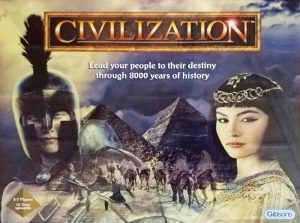 Before Sid Meier’s there was Francis Tresham. Best known for his creation of the 18xx genre of train games, Francis Tresham is also responsible for developing the civilization building tech-tree mechanism with his 1980 classic Civilization. This is truly the root that sprouted the modern version of the genre. Removing the dice-rolling mechanisms, Tresham was able to tap into the anti-luck sentiment that many modern gamers still carry with them to this day. While this is certainly one of the sparks that started the fire, the question is whether or not it can still satisfy a modern audience. Read on to see how it played out with our group.
Before Sid Meier’s there was Francis Tresham. Best known for his creation of the 18xx genre of train games, Francis Tresham is also responsible for developing the civilization building tech-tree mechanism with his 1980 classic Civilization. This is truly the root that sprouted the modern version of the genre. Removing the dice-rolling mechanisms, Tresham was able to tap into the anti-luck sentiment that many modern gamers still carry with them to this day. While this is certainly one of the sparks that started the fire, the question is whether or not it can still satisfy a modern audience. Read on to see how it played out with our group.
Civilization is an area control, set collection, civilization building board game for 2 to 7 players and can take from 2.5 to 8 hours.
Gameplay Overview:
There are many steps to a single turn (THIRTEEN) and while they aren’t difficult in practice, they seem to be difficult to communicate and visualize without your hands on the paper. I will attempt to summarize as best I can, but honestly feel free to check out the rules somewhere online or watch a runthrough on your favorite video streaming service to get a real feel for the nuances in the playthrough.
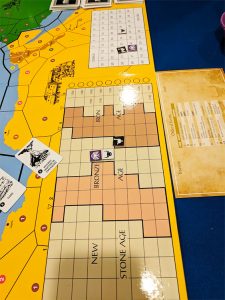
Players start by choosing an ancient culture and placing their starting populations in different areas of the ancient world. Each turn these populations grow, migrate, enter into conflict with one another, overwhelm a geographic area, and/or revolt. Populations can also be converted to cities, but if they aren’t, and the maximum population for an area is reached, that area revolts (i.e. bad stuff happens). Cities are used to generate commodity/trade cards from the nine different commodity types for players. Mixed in with the trade cards though are calamity cards (Volcanic Eruption, Earthquakes, Flood, etc) which, unsurprisingly, can wreak havoc on the board later in the turn.
The real pioneering mechanism that Tresham introduced with Civilization was in the trading of these commodity/trade cards for civilization cards. While most of the civilization cards are prerequisites or discounts toward more valuable civilization cards, some of them grant extra abilities such as extra movement, conflict benefits, or resistance to calamities. In the end though, the real value of these cards are the points they grant towards the progress chart for each player.
The progress chart splits play into 5 epochs. While the first four epochs require players to merely have a number of civilization cards, the final epoch requires players to achieve 1200 to 1400 points (depending on the culture) in civilization cards to win the game.
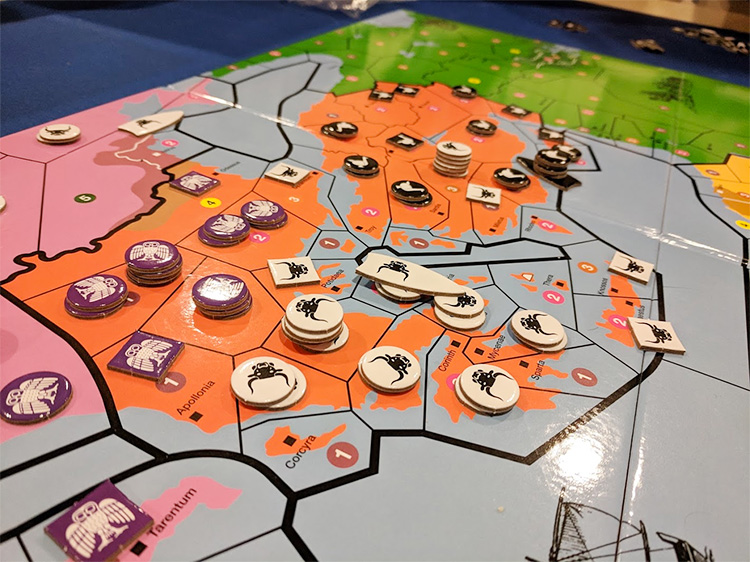
Game Experience:
Civilization is a solidly developed game and has been so for a long time. Because of this, the rulebook is, to say the least, robust. It is not a sit down and wing it kind of book. It reads like tax code and getting through the book and finally to the table will be a labor of love or curiosity. Like some sort of board game Indiana Jones, you will need to put in the legwork to uncover the treasure beneath. That isn’t to say that the Gibson rulebook isn’t good, it is truly the only way for a modern board gamer to learn this classic (you should see the original), but it doesn’t make it easy for you.
I’m going to repeat, because it bears repeating, this is a long game. It is from a time before streamlining (not that it isn’t somewhat streamlined) when hobby games filled as much of an afternoon or a weekend as the players could stomach. Complicating this is that there are two games layered on top of one another: an area control game at its core with a set-collection game that equates to a tech tree on top.
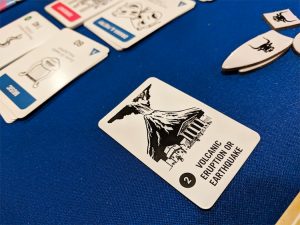
Modern civilization building games stand on the shoulders of giants and in my humble opinion, Civilization by Francis Tresham is that giant. Its greatest achievement is probably that it is the game which pioneered the modern civilization game technology progression. Although it feels thin today when you consider the tech trees that are so common in the genre now.
And here is what I love about this game – there is very little luck or randomness involved. The chances for drawing an event card are known from the start. There is one event in each goods deck. As players whittle down the goods piles and gradually build their wealth, they become more susceptible to drawing a dreaded event. This is not random. This is entirely predictable – these cards will come up. Period.
It is refreshing how sensibly and strategically combat is resolved and how it consistently underscores itself as a costly option. Players remove each other’s population tokens until the maximum population for that area is met. This means that at the end of a combat, it is possible that two player populations could be co-existing in the same place expanding their populations (again) on the next turn. Likewise, heavily defended and fortified areas can become virtually wastelands in a single turn. Players find themselves balancing rebounding population against revolts from within and the simple migration of their neighbors. This is easily the brain-burniest part of the game and is leaves players with no easy choice between deprioritizing growth in some regions and emphasizing population growth in areas that can accommodate it.
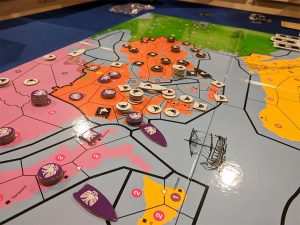
Ultimately, working around combative situations is the real strategy in Civilization. To paraphrase Mahatma Gandhi’s biographer Louis Fischer, an eye for an eye will leave everyone blind. This isn’t a game about laying waste to your opponents. Instead it is about incrementally growing around them, developing innovations and technologies so that when the time comes and weakness is sown in an opponent’s stronghold from overpopulation or migration, you are already waiting in the wings ready to take control. It is a thing of beauty.
Final Thoughts:
Gibson Game’s commitment to publishing Civilization with essentially the original ruleset may be a sticking point for some players, but modern civilization building games grew out from this original. As such, players may feel there is a lack of depth in some mechanisms. The tech tree design, while once innovative, seems thin and is essentially set collection. Furthermore, a 2 hour session is not an experience of the full game and a 7 hour full-length game is probably too much to ask for most players.
Then again, if someone is interested in playing a classic, learning the roots of the genre, and having a great time doing it, 7 hours probably just enough. For most playthroughs, we played up to the final age, but didn’t have the wherewithal to power through to the end with the ebb and flow of populations as our technologies and innovations developed, events reoccurred, and battles ensued.
The game allows for these abbreviated playthroughs and has several rulesets for accommodating shorter sessions, so they aren’t without merit, but a full length game is a thing to behold, even once, for fans of the genre. The Gibson Games edition of Francis Tresham’s Civilization is a welcome implementation of this classic progenitor of the genre. Although it definitely shows it’s age, it remains a fun game and a welcome rerelease.
Final Score: 3.5 – Good Game. Does a lot right, but some weaknesses to fans of modern civilization games will be rewarded for digging through this one for the treasures within.
 Hits:
Hits:
• A nicely produced rerelease that stays true to its roots.
• Great way to introduce modern fans to an older classic.
• Updated board colors lead to less eye strain than previous releases.
Misses:
• Would have liked a modernized variant in the box.
• A full game will be a rarity for most gamers.
• The rules still read like tax code.























I still have the classic on the bookshelf – never sees game play! 🙁
Playing our year round. Typically we take 2 days. Stop somewhere toward the end. Looking for a replacement as our original version is getting beat up 🙂